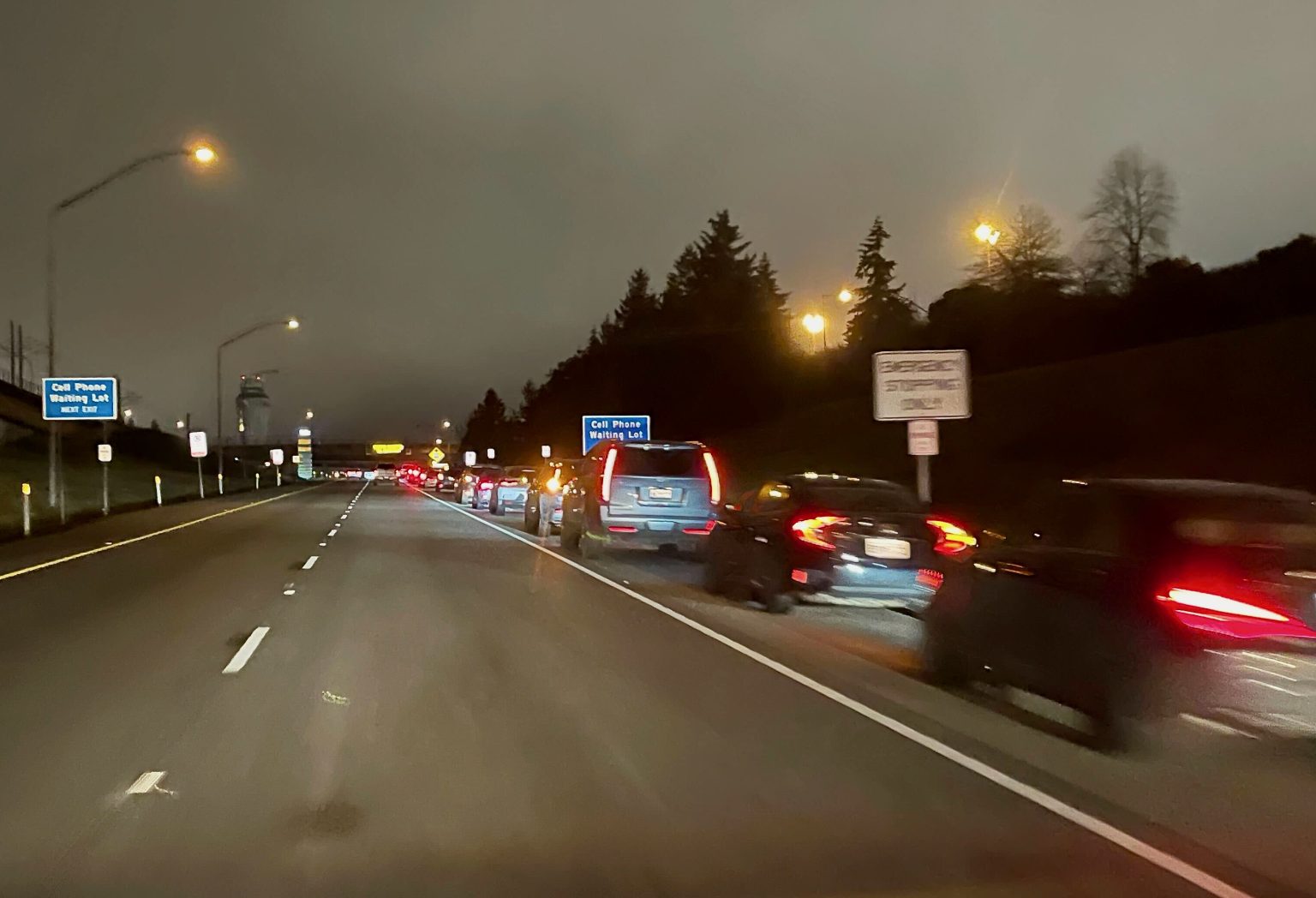Summarize this content to 2000 words in 6 paragraphs
Cars lined up along the side of the road heading into Seattle-Tacoma International Airport on Monday night. (GeekWire Photo / Taylor Soper)
The Port of Seattle plans to implement technology that it hopes will deter drivers at Seattle-Tacoma International Airport (SEA) from parking alongside airport roadways while waiting to pick up arriving travelers.
A Port official confirmed that a system is being developed to automatically read the license plates of cars parked on the side of the road. It’s not clear what type of license-plate-reading tech the Port will use. But mobile systems adopted by other government agencies, including the Seattle Police Department, capture images of license plates to enforce laws.
The Port official told GeekWire the system wasn’t ready to be deployed just yet.
SEA features a “cell phone lot” intended to give drivers a free parking space where they can wait for inbound travelers to call upon arrival. The lot is a short distance from the airport terminal.
SEA says on its website that drivers can wait up to 20 minutes in the cell phone lot.
Improvements in 2022 were aimed at smoothing the entrances and exits to the 200-space lot and keeping traffic flowing on the nearby Airport Expressway, South 170th Street, and Air Cargo Road.
Vehicles stream into the cell phone lot at Sea-Tac Airport Monday night where they can park for free while awaiting arriving travelers. (GeekWire Photo / Taylor Soper)
But congestion at the airport is a significant enough problem that many drivers ignore no parking signs on roadways outside the cell phone lot and do their waiting on the road shoulder instead.
Seattle satirical news website The Needling recently made light of the problem, reporting that the no parking signs had become an airport visitor attraction for selfies. Commenters on Reddit (such as those below) expressed frustration over what some called a years-old problem, calling for the airport to issue tickets. Others complained about long wait times trying to exit the cell lot.
“Seems like one enforcement vehicle with a camera … could automatically grab license plates and send tickets to the vehicle’s registered address based on the plates. We have photo-enforced red light cameras already. Not a big stretch?” — @MacaronEffective8250
“When traffic is backed up over half a mile, and it is very often, it takes a lot of time to get out of the cell lot and back to the terminals. Where people currently sit, illegally, it’s almost the ideal spot for saving time and making sure you’re ready to pick people up ASAP.” — @Hazjut
On Monday night, GeekWire drove along the road leading into the airport and spotted dozens of cars parked illegally, in sight of signs reading “Emergency stopping only” and “No parking any time.” Meanwhile, the cell phone lot appeared to be about 90% full.
The Link light rail line passes over Airport Expressway where cars are lined up along the side of the road on the way into Sea-Tac Airport Monday night. (GeekWire Photo / Taylor Soper)
The Seattle Police Department relies on automated license plate reader (ALPR) technology for its entire fleet of patrol cars.
SPD says it uses ALPR as a tool to address crime across the city, including tracking stolen vehicles which can be used to commit additional crimes.
According to SPD, “ALPR is a combination of software and hardware used for capturing and monitoring images of license plates. High definition infrared digital cameras are mounted on patrol cars to capture images of license plates. Those numbers are then validated by officers and relayed to dispatch.”
The Seattle City Council approved the fleet-wide expansion of the technology last summer, adding amendments to a bill to address privacy concerns, such as protecting the personal information of individual drivers.
Police departments around the country have been using the technology for years. The ACLU has expressed concerns related to such systems for over-surveillance and excessive location tracking, and calls for more stringent regulation.












